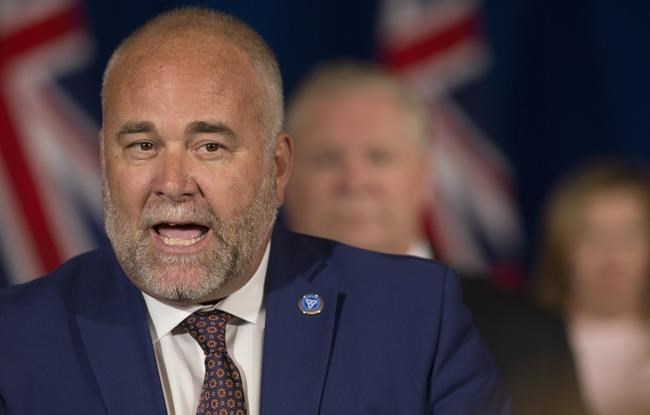TORONTO — The Ontario Energy Board strayed "out of their lane" with a decision that would increase costs for new homes heated with natural gas, the province's energy minister said Friday as he promised to overturn it.
But environmental groups said the OEB's decision was a huge win for the environment and Ontarians, as it would have encouraged the uptake of greener home heating and cooling, such as with heat pumps, and the reversal would be just a gift to Enbridge Gas.
The OEB decision relates to a rate application from Enbridge, which serves the majority of natural gas customers in the province. The energy board said the utility's long-term plan is unreasonable because it assumes that every new housing development will include gas servicing and that homebuyers will remain on gas for 40 years, despite an energy transition toward electrification.
Despite this trend, Enbridge's forecasts show continued growth in natural gas peak demand, with $14 billion in capital spending over the next 10 years, the board wrote in a split decision.
"The OEB is not satisfied that Enbridge Gas's proposal will not lead to an overbuilt, underutilized gas system in the face of the energy transition," the majority of the board wrote.
Enbridge's "business as usual" plan to amortize the cost of a natural gas connection over 40 years for customers will leave a large stranded asset risk as some customers inevitably get off natural gas, and that's a cost that would be paid by future ratepayers, the decision said.
Instead, the OEB said the connection cost, which Enbridge estimated at about $4,400, should be paid up front by home developers to address that risk and incentivize developers "to choose the most cost-effective, energy-efficient choice."
Consumers would benefit if developers chose to forego that up-front cost and opted against gas lines, the OEB wrote.
"The effect of this choice would be to lower the cost of housing, depending on the capital cost differential between gas and electric equipment, by avoiding paying a (cost) for gas servicing, and lower the operating energy cost of the house – a win for homebuyers and an outcome for developers that keeps them competitive on price in the housing market."
Energy Minister Todd Smith said the OEB "was a bit out of their lane on this."
"The majority of the meetings that I have with municipalities are municipalities that want to see natural gas expanded into their communities because it is the most affordable and efficient way to heat their homes," he said in an interview.
"Essentially, what this decision does, I believe, is eliminates that choice for customers who are looking at natural gas and really pushes them in one direction, and that is electrification. While we are moving to a more electrified province, again, we're doing it in that measured way."
Smith said he plans to introduce legislation that would reverse the OEB decision.
Advocacy group Environmental Defence called Smith's response "shocking."
"The OEB decision is a win-win for everyone but Enbridge, which stands to lose both customers and profits," it wrote in a statement.
"The government’s assertion that the OEB decision would halt the construction of homes is false. Developers can just forgo gas connections and install heat pumps instead, which would be 'a win for homebuyers' in the OEB’s words."
Keith Stewart, Greenpeace Canada's senior energy strategist, said the construction cost of new gas connections should be paid up front, not over 40 years, so developers face the true cost and future new homeowners aren't saddled with a higher-cost heating system.
"The Ford government has given Enbridge Gas a very expensive Christmas present, but it is the rest of us who will be footing the bill unless it is reversed," he wrote in a statement.
"Ontarians should be asking why Doug Ford is recklessly overruling the OEB’s decision that the gas distribution sector faces a serious risk of stranded assets and that system expansion adds to that risk."
The OEB heard submissions from a large number of groups and heard suggestions to lower that 40-year amortization period to either 30, 20, 15 or zero years. The zero years idea – meaning the total cost of gas servicing is paid up front – largely came from two environmental groups.
Smith said it's concerning that the OEB didn't hear from construction companies or ratepayers.
"This was really an irrational decision," he said. "I mean, going from 40 years amortization down to zero is anything but a measured decision."
One of the three OEB commissioners dissented in the split decision, saying the evidence doesn't support pushing the costs completely up front.
"Is the scenario of no-new-gas-connections, replaced by construction of all-electric developments, feasible?" Allison Duff wrote.
"For example, would electricity generators, transmitters, distributors and the (Independent Electricity System Operator) be able to meet Ontario’s energy demands in 2025? I don’t know."
Enbridge said it is disappointed with the decision and it is reviewing all of its potential options for challenging the order, including going to court.
"At a time when affordability is the number one concern for Ontarians, this decision means that new customers will have to pay for their connection to natural gas immediately rather than over several years, adding unnecessary costs to residents," spokesperson Leanne McNaughton wrote in a statement.
This report by The Canadian Press was first published Dec. 22, 2023.
Allison Jones, The Canadian Press



